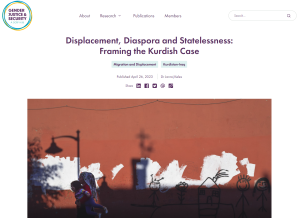Displacement, Diaspora and Statelessness: Framing the Kurdish Case
 In this article, we draw on a growing body of literature and a set of empirical work carried out over a period of many years and through various projects to examine the characteristics of Kurdish refugee communities, concentrating on the triangular relationship between statelessness, displacement, and diaspora. By keeping our focus on these linked relationships, we aim to answer the following questions: What explains internal and external displacement of the Kurdish communities in the past and present? What influences the ways in which Kurdish migrants organise their activities and shape their collective action—as well as their identities and sense of belonging—in the receiving societies? What impact does the question of statelessness have on displacement, belonging, and diaspora? In addressing these questions, we present a conceptual approach to the widespread phenomenon of statelessness in the Kurdish context, examining how statelessness simultaneously deprives the full enjoyment not only of citizenship rights but also of self-rule, that is, systematic violations of citizens’ rights and liberties, on the one hand, and communal rights, protection, and recognition, on the other. We argue that belonging to, and identification with, a polity or host society can be best achieved if inclusion and recognition come together to inform citizenship.
In this article, we draw on a growing body of literature and a set of empirical work carried out over a period of many years and through various projects to examine the characteristics of Kurdish refugee communities, concentrating on the triangular relationship between statelessness, displacement, and diaspora. By keeping our focus on these linked relationships, we aim to answer the following questions: What explains internal and external displacement of the Kurdish communities in the past and present? What influences the ways in which Kurdish migrants organise their activities and shape their collective action—as well as their identities and sense of belonging—in the receiving societies? What impact does the question of statelessness have on displacement, belonging, and diaspora? In addressing these questions, we present a conceptual approach to the widespread phenomenon of statelessness in the Kurdish context, examining how statelessness simultaneously deprives the full enjoyment not only of citizenship rights but also of self-rule, that is, systematic violations of citizens’ rights and liberties, on the one hand, and communal rights, protection, and recognition, on the other. We argue that belonging to, and identification with, a polity or host society can be best achieved if inclusion and recognition come together to inform citizenship.